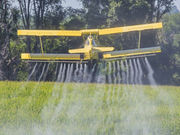But researcher says finding doesn’t prove cause-and-effect connection
MONDAY, May 2, 2016 (HealthDay News) — Children living in an area of New York state that uses aerial pesticides to control mosquitoes have a higher rate of autism than children in neighboring areas, according to findings presented at the annual meeting of the Pediatric Academic Societies, held from April 30 to May 3 in Baltimore.
Steven Hicks, M.D., Ph.D., a pediatrician at Penn State Milton S. Hershey Medical Center, and colleague looked at autism diagnoses among children at pediatric clinics in two New York state areas: eight zip codes within a swampy area where officials used aerial spraying of pyrethroid pesticides to control mosquitoes, and 16 zip codes that used different methods to apply pesticides, such as using hoses or manually spreading granules.
The researchers found that in the area with aerial spraying, one in 120 children was diagnosed with an autism spectrum disorder or developmental delay. The prevalence in areas without aerial spraying was one in 172. After the investigators accounted for factors such as local poverty levels and preterm birth rates, children in the zip codes with aerial spraying were still one-quarter more likely to have been diagnosed with an autism spectrum disorder.
“That suggests it’s not just the type of pesticide or the timing of exposure, but the mode of application that matters,” Hicks told HealthDay. However, he stressed, there could be other explanations for the link. And it’s not clear whether the children’s mothers lived in those zip codes during pregnancy — a “big limitation” of the study, he added.
Copyright © 2016 HealthDay. All rights reserved.








